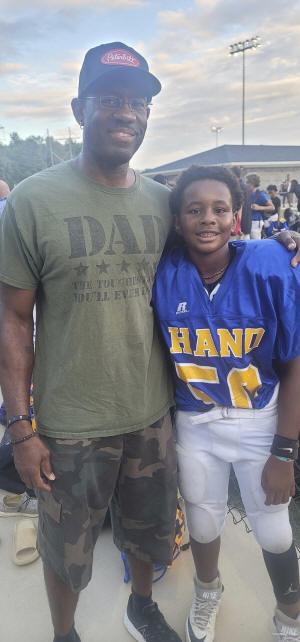Parents want more warnings after a brain-eating amoeba killed their son
on a South Carolina lake
[July 30, 2025]
By JEFFREY COLLINS
COLUMBIA, S.C. (AP) — Two weeks after Jaysen Carr spent the Fourth of
July swimming and riding on a boat on one of South Carolina's most
popular lakes, he was dead from an amoeba that lives in the warm water
and entered his brain through his nose.
His parents had no clue the brain-eating amoeba, whose scientific name
is Naegleria fowleri, even existed in Lake Murray, just 15 miles (24
kilometers) west of Columbia.
They found out when a doctor, in tears, told them the diagnosis after
what seemed like a fairly regular headache and nausea took a serious
turn.
Jaysen, 12, fought for a week before dying on July 18, making him one of
about 160 people known to have died from the amoeba in the U.S. in the
past 60 years.
As they grieve their son, the boy's parents said they were stunned to
learn South Carolina, like most other U.S. states, has no law requiring
public reporting of deaths or infections from the amoeba. The lake
wasn't closed and no water testing was performed. If they hadn’t spoken
up, they wonder if anyone would have even known what happened.
“I can't believe we don't have our son. The result of him being a child
was losing his life. That does not sit well. And I am terrified it will
happen to someone else," Clarence Carr told The Associated Press as his
wife sat beside him, hugging a stuffed tiger that had a recording of
their middle child's heartbeat.
The best Fourth of July ever
Jaysen loved sports. He played football and baseball. He loved people,
too. As soon as he met you, he was your friend, his father said. He was
smart enough to have skipped a grade in school and to play several
instruments in his middle school band in Columbia.
“He either loved you or he just didn't know you,” his father said. “He
was the type of person who could go to a jump park and five minutes
later say, ‘This is my friend James.’”
Friends invited Jaysen and his family for the Fourth of July holiday
weekend on the lake, where Jaysen spent hours swimming, fishing and
riding on an inner tube that was being pulled by a boat.
“Mom and Dad, that was the best Fourth of July I’ve ever had,” Clarence
Carr remembered his son telling him.

A headache suddenly gets worse
A few days later, Jaysen's head started to hurt. Pain relievers helped.
But the next day the headache got worse and he started throwing up. He
told the emergency room doctors exactly where he was hurting. But soon
he started to get disoriented and lethargic.
The amoeba was in his brain, already causing an infection and destroying
brain tissue. It entered through his nose as water was forced deep into
his nasal passages, possibly from one of the times Jaysen jumped into
the water. It then traveled along his olfactory nerve into his brain.
The amoeba caused an infection called primary amebic meningoencephalitis.
Fewer than 10 people a year get it in the U.S., and over 95% of them
die. The last death from the amoeba in South Carolina was in 2016,
according to the Centers for Disease Control and Prevention.
The amoeba is fairly common. There is no science-based threshold for
what level of the organism in the water would be safe or unsafe, and it
would be difficult to test water regularly, the South Carolina
Department of Environmental Services said in a statement.
[to top of second column]
|

This family photo shows Clarence Carr and his son Jaysen at his
middle school football game in Columbia, S.C. (Carr Family via AP)
 Researchers are still trying to
figure out why the infections are so rare. Some people have been
found to have had antibodies, signaling they may have survived
exposure. Others may die from brain swelling and other problems
without the amoeba ever being detected.
Last year, the CDC started a pilot program of giving infected
patients an antibiotic approved for use in Europe that has killed
the amoeba in lab studies
The amoeba is found in warm water and the infection is almost
always fatal
The amoeba becomes dangerous in water that stays over 77 degrees
Fahrenheit (25 degrees Celsius) and for years has been seen almost
exclusively in the summer in the southern part of the country. But a
few recent cases have popped up in Maryland, Indiana and Minnesota,
scientists said.
The CDC said 167 cases of the infection have been reported in the
U.S. between 1962 and 2024, and only four people have survived.
One infection in a body of water doesn't increase the chances of
another infection in the same body of water, the CDC said. The
amoeba cannot move from one person to another.
Boys seem most susceptible, but researchers don't know if that is
simply because they are more likely to jump and dive into the water
or play in sediment at the bottom of lakes.
The amoeba can show up in hot springs, rivers and, on rare
occasions, in tap water. That's why doctors recommend using sterile
water for cleaning nasal passages with a neti pot.
The only way to be completely safe is to not swim in lakes or rivers
and, if you do, keep your head above water. Pinching your nose or
using nose clips when diving or swimming can keep water out of your
nose.
Parents want others to know the danger from the brain-eating
amoeba
As he sat in an intensive care hospital room with his son, Clarence
Carr couldn't help but think of all the people on the lake.
He wondered if any of them had any clue about the microscopic danger
in that water.
“There are entire families out there on pontoon boats, jumping off,
just like our kids were having the time of their lives,” he said.
“It very well could be their last moments, and they are unaware of
it.”
All contents © copyright 2025 Associated Press. All rights reserved |